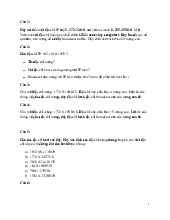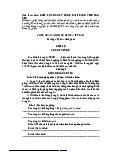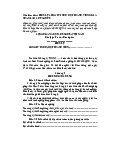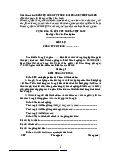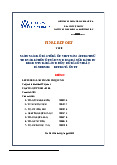




Preview text:
Questions and Answers Section 1 Question:
In relation to an international registration or a subsequent designation, what is a designated Contracting Party? Answer:
In relation to an international registration or a subsequent designation, a designated
Contracting Party is a country or intergovernmental organization member of the Madrid System
that has been selected (designated) in an international registration or subsequently to this
(subsequent designation). A designated Contracting Party represents a territory in which the
holder is seeking protection for their trademark. Question:
The Office of a Contracting Party is notified by WIPO that it has been designated subsequently
to the international registration. Is the Office’s main task the same as if it had been included in
the original international registration? Answer: Yes.
The main task of the Office of a designated Contracting Party is to decide on the possible scope
of protection of the mark in its territory. This means that the Office should undertake
substantive examination of the mark subject of the international registration to determine if it
can be granted protection in its territory. It does not matter to the Contracting Party whether it
is designated in the international registration or subsequently to this, in a subsequent
designation. The task of its Office is the same. Question:
What sets the conditions for protecting a mark and the requirements for the procedures to be
followed in Madrid System Contracting Parties? Answer:
The domestic legislation of each member of the Madrid System sets the conditions for
protecting a mark and the requirements for procedures to be followed. Section 2 Question:
An international registration is provisionally refused by the Office of a designated Contracting
Party due to specific terms of goods and services it considers too broad or too vague. Will this
have an effect on the goods and services in the main list of the international registration? Answer:
No, it will not have an effect on the goods and services in the main list of the international registration.
Where the Office finds that terms used are considered to be too broad or vague, the Office
must raise this in a provisional refusal, resulting in that the concerned terms be replaced by a
narrower or precise term entered in the International Register only with regard to the Contracting Party concerned. Question:
The domestic legislation of a Contracting Party requires that an application made directly to that
Office must be in one class only.
As the Office of a designated Contracting Party will conduct substantive examination of an
international registration or a subsequent designation in the same way it would conduct
substantive examination of an application for registration filed directly with that Office, will the
Office issue provisional refusals on marks notified to it by WIPO that include more than one class? Answer:
No, the Office of a Contracting Party cannot issue a provisional refusal just because the
international registration contains multiple classes.
Even if the domestic legislation of a Contracting Party requires that an application made directly
to that Office must be in one class only, the Office must accept that an international registration
designating that Contracting Party contain multiple classes (Article 5(1) of the Protocol). Question:
A designated Contracting Party has the right to grant or refuse protection of a mark in its
jurisdiction. Is there a time limit for the Office of a Contracting Party to notify WIPO of a provisional refusal of a mark? Answer:
Yes, a provisional refusal must be notified to WIPO within a prescribed time limit. The standard
time limit is 12 months, with the possibility for the Contracting Party to make a declaration with
WIPO extending the refusal period to 18 months. Section 3 Question:
An international registration recorded in the International Register on January 10, 2016 includes the following designations: Iceland Latvia Namibia Ukraine
On December 25, 2017, a subsequent designation is recorded for the following Contracting Parties: Algeria Madagascar Poland
The Contracting Parties subsequently designated are notified by WIPO of the subsequent
designation on January 10, 2018.
Can the subsequently designated Contracting Parties still issue a provisional refusal given that
the international registration has been recorded in the International Register for two years already? Answer:
Yes, the Contracting Parties subsequently designated can still issue a provisional refusal for the mark.
The time limit for a provisional refusal begins from the date on which WIPO has notified the
Office of the designated Contracting Party of the international registration or the subsequent
designation concerned (notification date). Question:
A Contracting Party has declared that the standard 12-month time limit for issuing a provisional
refusal be replaced by 18 months.
The Office of that Contracting Party is notified by WIPO of an international registration on July
15, 2018. As on the date of December 15, 2019, the Office has not communicated any
notification of provisional refusal to WIPO.
Is the mark deemed to be protected in that Contracting Party? Answer:
No, the mark cannot yet be considered protected in that Contracting Party.
The time limit for issuing a provisional refusal begins from the date on which WIPO has notified
the Office of the designated Contracting Party of the international registration or the
subsequent designation concerned (notification date).
In this case, the time limit for issuing a provisional refusal begins on July 15, 2018. The Office of
that Contracting Party may still notify WIPO of any provisional refusal until January 15, 2020 (18 months). Scenario Answers
Time Limits for Refusal and Tacit Acceptance Question 1:
WIPO will not be able to record the provisional refusal because it was sent after the applicable
time limit to notify provisional refusals to WIPO.
When a designated Contracting Party has made a declaration under Article 5(2)(b) of the
Protocol, the Office has 18 months to notify WIPO of a provisional refusal. When a designated
Contracting Party has not made a declaration under Article 5(2)(b) of the Protocol, the Office
has 12 months to notify WIPO of a provisional refusal.
As the provisional refusal was sent 20 months after the date of notification by WIPO, WIPO
cannot record the provisional refusal because it was sent after the applicable time limit to issue provisional refusals. Question 2:
The mark will be considered protected for the services in class 42 in the designated Contracting Party.
Because no refusal was received by WIPO within the prescribed time limit, the mark is deemed
to be automatically protected for all goods and services in the international registration,
including the services in class 42, under the principle of tacit acceptance.
Possibility of Notification of a Provisional Refusal Based on an Opposition after 18-Month Time Limit Question 1:
The information the Office of a designated Contracting Party would need to provide to WIPO is:
The name of the Office (Section I).
The international registration number (Section II).
The name of the holder (Section III).
The dates on which the opposition period begins and ends, if these dates are known
at the time of this notice to WIPO (Section IV). If those dates are not yet known,
they shall be communicated to WIPO as soon as they are known (by using Model
Form 2). If the opposition period is extendable, the Office may communicate only
the date on which the opposition period begins.
The Office’s signature or seal (Section V).
The date on which the notification is sent to WIPO (Section VI). Question 2:
The Office of a designated Contracting Party has to provide the above-mentioned information to
WIPO before the expiry of the 18-month time limit for issuing a provisional refusal.
